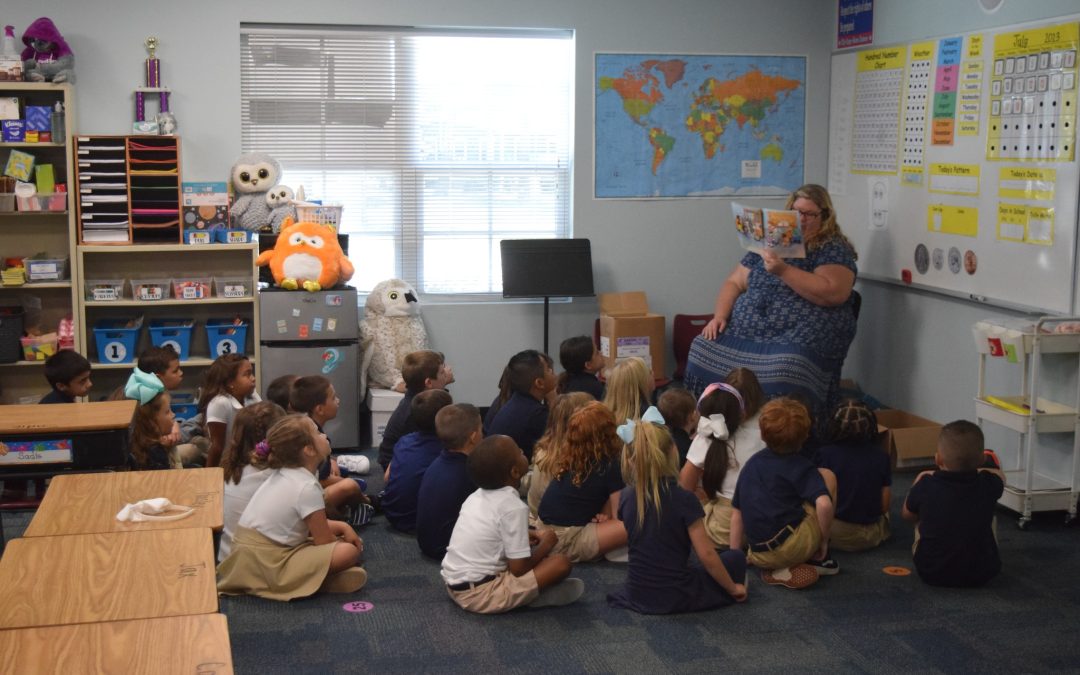By Baker A. Mitchell Jr.
August 2, 2023 at 6:30 AM
In many school districts, the learning gap remains a persistent, serious concern. Meanwhile, charter schools are closing that gap.
Public-school administrators across the country are still lamenting their students’ pandemic-related “learning losses.” But the 2,700 students in our four schools are a different story.
Our kindergarten students already are being introduced to reading and most will be reading on their own by next spring, and often much sooner. Our fifth-grade students are beginning Latin, the root of many other languages and the language of science, medicine, and law.
If the 2023–24 school year is anything like last year (and virtually every other year since we welcomed our first students in 2000), our student test scores on North Carolina’s required end-of-grade exams next spring will eclipse those of nearby district schools. That’s always a point of pride, since the state tests are based on a curriculum we don’t use. Our classical curriculum and instructional methods, dare I say, are better, because the skills they teach allow generalized application to any test.
Yet, many educational elites look down their noses at us. We’re that regressive, backwater charter-school outfit that uses phonics — sounding out the letters — to teach beginners how to read; we teach our students to write in cursive; we even require rote memorization of math facts; we have a code of conduct that our students are expected to observe; and, yes, our students wear uniforms and recite the Pledge of Allegiance every morning.
Despite our critics, hundreds of parents from a variety of ethnic and racial backgrounds continue to entrust us with the education of their children. We rarely disappoint them — nor do the vast majority of charter schools nationwide, according to an important new study published in June.
The voluminous study by the Center for Research on Education Outcomes at Stanford University compared student academic growth in three groups of schools: stand-alone charter schools; charter schools managed in a network by a charter-management organization; and traditional public schools.
The Stanford researchers gathered test results from 2.7 million students at 7,300 charter schools in 31 states and studied the academic achievement and advancement of the 1.8 million students for whom they had four complete years of data.
But they didn’t do this in a vacuum. For each charter student, they also compiled data on a peer student in a nearby traditional public school — students who were virtually identical to their charter “twins” in grade, race, sex, zip code, income, disabilities, and so forth. This enabled them to compare the academic progress of each charter student with their traditional public-school twin over the four-year study period.
The researchers found that “in both reading and math charter schools provide students with stronger learning” than the traditional public schools they ordinarily would have attended. Among charters, those in group networks administered by charter-management organizations generally did best.
Apologists for the education establishment try to dismiss such findings by accusing charter schools of “cherry-picking” the best students, leaving the others behind for the district schools to deal with. The Stanford researchers tested for this and found the opposite to be true: that more charter students start at lower placement levels — and fewer start at higher placement levels — than their virtual-twin students in traditional public schools, the reverse of “cherry-picking.” As the Stanford researchers reported, “Charter schools produce superior student gains despite enrolling a more challenging student population than their adjacent [traditional public schools].”
The Stanford researchers used a clear-cut method of measuring student progress: the expectation that in 180 days of school, a student will gain on average 180 days of learning from one year’s test to the next. If a student’s score advance is above average, the student would have gained the equivalent of additional days of learning above the 180-day threshold. If a student’s advance is below average, the student would be credited with minus days of learning.
Of the three school groupings studied, students at charter schools managed by a network organization did the best, achieving 27 additional days of learning in reading and 23 additional days of learning in math above the expected 180-day baseline — more than an entire extra month of learning at no added cost.
While the overall results should be enough to shake up the education bureaucracy, “the real surprise of the study,” the researchers reported, was “the number of charter schools that . . . achieved educational equity for their students” — eliminating, for all practical purposes, the achievement gap between white students and “minority and poverty students.” They coined the term “gap busters” to describe such schools.
Charter-management-organization networks were credited with being “gap busters” if (1) the network’s average achievement percentages were above their state’s traditional school averages, and (2) the added days of learning above the traditional schools was as strong for disadvantaged students as for non-disadvantaged students. Of the 378 networks the researchers evaluated, the Roger Bacon Academy, I’m proud to say, was among the highest rated.
Several years ago, I wrote to the new superintendent of a local school district suggesting we get together and discuss ways to collaborate. I never received a reply.
In many school districts, the learning gap remains a persistent, serious concern. The Stanford researchers endorse the idea of “collaborations between charter schools and local school districts.” The former superintendent recently left. Perhaps his successor will have a different response?











